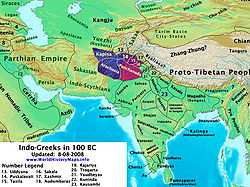Indo-Greek Kingdom
| Indo-Greek Kingdom | ||||||||||
|
||||||||||
|
Indo-Greek Kingdoms in 100 BC.
|
||||||||||
| Capital |
Alexandria in the Caucasus Sirkap/Taxila Chiniot Sagala/Sialkot Pushkalavati/Charsadda |
|||||||||
| Languages |
Greek (Greek alphabet) Pali (Kharoshthi script) Sanskrit Prakrit (Brahmi script) |
|||||||||
| Religion |
Buddhism Ancient Greek religion Hinduism Zoroastrianism |
|||||||||
| Government | Monarchy | |||||||||
| King | ||||||||||
| • | 180–160 BC | Apollodotus I | ||||||||
| • | 25 BC – AD 10 | Strato II | ||||||||
| Historical era | Antiquity | |||||||||
| • | Established | 180 BC | ||||||||
| • | Disestablished | AD 10 | ||||||||
| Area | 2,500,000 km² (965,255 sq mi) | |||||||||
|
||||||||||
| Today part of |
|
|||||||||
The Indo-Greek Kingdom or Graeco-Indian Kingdom was a Hellenistic kingdom covering various parts of the northwest regions of South Asia (mainly modern Afghanistan and Pakistan) during the last two centuries BC and was ruled by more than thirty kings, often in conflict with each other.
The kingdom was founded when the Graeco-Bactrian king Demetrius invaded the subcontinent early in the 2nd century BC. The Greeks in South Asia were eventually divided from the Graeco-Bactrians centered in Bactria (now the border between Afghanistan and Uzbekistan). But the Greeks failed to establish united rule in present-day north-western South Asia. The most famous Indo-Greek ruler was Menander (Milinda). He had his capital at Sakala in the Punjab (present-day Sialkot, Punjab, Pakistan).
The expression "Indo-Greek Kingdom" loosely describes a number of various dynastic polities, traditionally associated with a number of regional capitals like Taxila, (modern Punjab (Pakistan)), Pushkalavati and Sagala. Other potential centers are only hinted at; for instance, Ptolemy's Geographia and the nomenclature of later kings suggest that a certain Theophila in the south of the Indo-Greek sphere of influence may also have been a satrapal or royal seat at one time.
Euthydemus I was, according to Polybius a Magnesian Greek. His son, Demetrius, founder of the Indo-Greek kingdom, was therefore of Greek descent from his father at minimum. A marriage treaty was arranged for Demetrius with a daughter of Antiochus III the Great, who had partial Persian descent. The ethnicity of later Indo-Greek rulers is less clear.
...
Wikipedia

